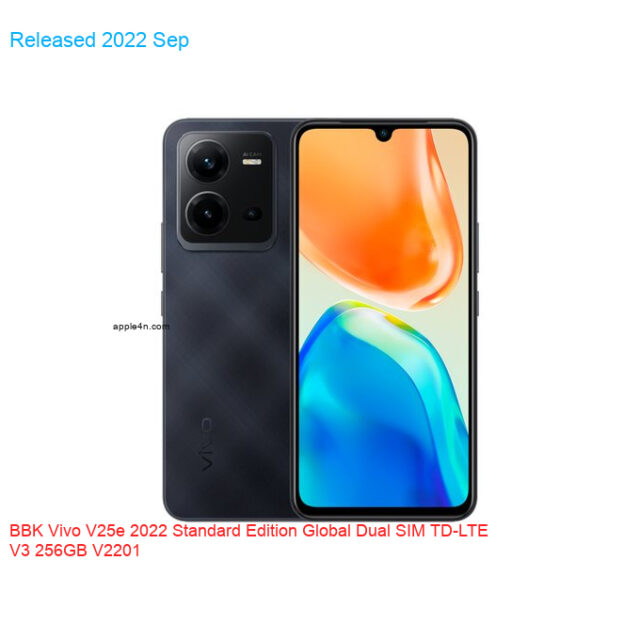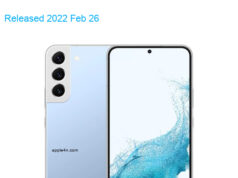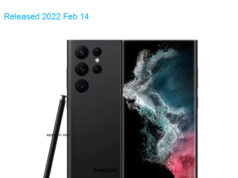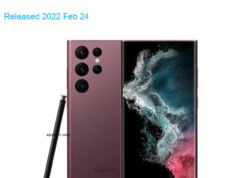| Brand | BBK |
| Model | Vivo V25e 2022 Standard Edition Global Dual SIM TD-LTE V3 256GB V2201 |
| Released | 2022 Sep |
| Announced | 2022 Aug |
| Hardware Designer | BBK Electronics |
| Manufacturer | BBK Electronics |
| Codename | BBK V2201 |
| General Extras | Haptic touch feedback |
| Device Category | Smartphone |
| Width | 74.2 mm |
| Height | 159.2 mm |
| Depth | 7.79 mm |
| Dimensions | 2.92×6.27×0.31 inches |
| Mass | 183 g |
| Platform | Android |
| Operating System | Google Android 12 (S) |
| Software Extras | Voice Command , Navigation software , Intelligent personal assistant , Face Recognition |
| CPU Clock | 2200 MHz |
| CPU | MediaTek Helio G99 MT6789, 2022, 64 bit, octa-core, 6 nm, ARM Mali-G57 GPU |
| RAM Type | LPDDR4x SDRAM |
| RAM Capacity (converted) | 8 GiB RAM |
| Non-volatile Memory Interface | UFS 2.2 |
| Non-volatile Memory Capacity (converted) | 256 GB ROM |
| Display Notch | 1-notch |
| Display Diagonal | 163.6 mm |
| Resolution | 1080×2404 |
| Horizontal Full Bezel Width | 7.16 mm |
| Display Area Utilization | 84.7% |
| Pixel Density | 409 PPI |
| Display Type | AM-OLED display |
| Number of Display Scales | 16.8M |
| Display Refresh Rate | 90 Hz |
| Scratch Resistant Screen | Yes |
| Graphical Controller | ARM Mali-G57MP2 |
| A/V Out | No |
| Microphone(s) | stereo |
| Loudspeaker(s): | mono |
| Audio Output: | USB Type-C |
| Supported Cellular Bands | GSM850 , GSM900 , GSM1800 , GSM1900 , UMTS2100 (B1) , UMTS850 (B5) , UMTS900 (B8) , LTE2100 (B1) , LTE1800 (B3) , LTE850 (B5) , LTE2600 (B7) , LTE900 (B8) , LTE800 (B20) , LTE700 (B28) , TD-LTE2600 (B38) , TD-LTE2300 (B40) , TD-LTE2500 (B41) bands |
| Supported Cellular Data Links | GPRS , EDGE , UMTS , HSUPA , HSUPA 5.8 , HSUPA 11.5 , HSDPA , HSPA+ 21.1 , DC-HSDPA 42.2 , LTE , LTE 100/50 , LTE 150/50 , LTE 300/50 , LTE 300/75 , LTE 600/50 data links |
| SIM Card Slot | Nano-SIM (4FF) |
| Complementary Phone Services | Voice transmission , Voice speaker , Vibrate , Speakerphone , ANC , HD Voice , VoLTE |
| Dual Cellular Network Operation | Dual standby |
| Sec. Supported Cellular Networks: | GSM850 , GSM900 , GSM1800 , GSM1900 , UMTS2100 (B1) , UMTS850 (B5) , UMTS900 (B8) , LTE2100 (B1) , LTE1800 (B3) , LTE850 (B5) , LTE2600 (B7) , LTE900 (B8) , LTE800 (B20) , LTE700 (B28) , TD-LTE2600 (B38) , TD-LTE2300 (B40) , TD-LTE2500 (B41) |
| Sec. Supported Cellular Data Links: | GPRS , EDGE , UMTS , HSUPA , HSUPA 5.8 , HSUPA 11.5 , HSDPA , HSPA+ 21.1 , DC-HSDPA 42.2 , LTE , LTE 100/50 , LTE 150/50 , LTE 300/50 , LTE 300/75 , LTE 600/50 |
| Sec. SIM Card Slot | Nano-SIM (4FF) |
| Touchscreen Type | Capacitive multi-touch screen |
| Expansion Interfaces | TransFlash , microSD , microSDHC , microSDXC |
| USB | USB 2.0 |
| USB Services | USB charging , USB fast charging , USB Host , USB OTG 1.3 , USB PD , USB PD 2.0 , USB PD 3.0 |
| USB Connector | USB C reversible |
| Max. Charging Power | 44.0 W |
| Bluetooth | Bluetooth 5.2 |
| Wireless LAN | 802.11a , 802.11b , 802.11g , 802.11n , 802.11ac |
| Wireless Services | Wi-Fi Tethering , WiDi , Wi-Fi Calling |
| FM Radio Receiver | FM radio (76-108 MHz) with RDS |
| Complementary Satellite Services | Simultaneous GPS , A-GPS , Geotagging , QuickGPS , QZSS |
| Supported GLONASS protocol(s) | L1OF |
| Supported Galileo service(s) | E1 |
| Supported BeiDou system (BDS) | B1I BeiDou receiver |
| Camera Placement | Rear |
| Camera Image Sensor | BSI CMOS |
| Number of effective pixels | 63.7 MP camera |
| Aperture (W) | f/1.79 |
| Zoom | 1.0 x optical zoom |
| Focus | PD AF |
| Video Recording | 3840×2160 pixel |
| Flash | dual LED |
| Camera Extra Functions | EIS (video) , OIS , Pixel unification , HDR photo , HDR video , Red-eye reduction , Slow motion video , Burst mode , Touch focus , Macro mode , Panorama Photo , Face detection , Face tagging , Smile detection , Face retouch , Face retouch (video) , Intelligent scene detection |
| Aux. Camera Image Sensor | BSI CMOS |
| Aux. Camera Number of Pixels | 1.9 MP aux. cam |
| Aux. Camera Aperture (W) | f/2.40 |
| Aux. Camera Extra Functions | HDR photo , Burst mode , Panorama Photo , Face detection , Face tagging , Smile detection |
| Aux. 2 Camera Image Sensor | CMOS |
| Aux. 2 Camera Number of Pixels | 1.9 MP aux. 2 cam |
| Aux. 2 Camera Aperture (W) | f/2.40 |
| Aux. 3 Camera Image Sensor | No |
| Aux. 4 Camera Image Sensor | No |
| Secondary Camera Placement | Front |
| Secondary Camera Sensor | BSI CMOS |
| Secondary Camera Number of pixels | 32.0 MP sec. cam |
| Secondary Aperture (W) | f/2.00 |
| Secondary Camera Focus | PD AF |
| Secondary Video Recording | 1920×1080 pixel |
| Secondary Camera Extra Functions | EIS , EIS (video) , Pixel unification , HDR photo , Slow motion video , Burst mode , Touch focus , Panorama Photo , Face detection , Face tagging , Smile detection , Face retouch , Face retouch (video) , Intelligent scene detection |
| Sec. Aux. Cam. Image Sensor | No |
| Built-in compass | Yes |
| Built-in accelerometer | Yes |
| Built-in gyroscope | Yes |
| Additional sensors | In-screen FP sensor , L sensor , P sensor |
| Protection from solid materials | Yes |
| Protection from liquids | Yes |
| Battery | Li-ion polymer (LiPo) |
| Nominal Battery Capacity | 4500 mAh battery |
| Market Countries | Malaysia , Philippines |
| Market Regions | Asia , Europe , Oceania , Southeast Asia |
| Price | 293.79 USD |
| Added | 2025-02-14 |
Specifications data description of this 📱BBK Vivo V25e 2022 Standard Edition Global Dual SIM TD-LTE V3 256GB V2201📱
Title: BBK Vivo V25e 2022 Standard Edition Global Dual SIM TD-LTE V3 256GB V2201: A Comprehensive Device Specification Overview 🌐📅🏋️🌈🤖🛠️🚀
Introduction:
Welcome to our blog post, where we will explore the specifications of the BBK Vivo V25e 2022 Standard Edition Global Dual SIM TD-LTE V3 256GB V2201. This device has gained popularity for its powerful features, sleek design, and cutting-edge technology. Let’s dive into the details!
Lineup:
The BBK Vivo V25e is a part of Vivo’s ambitious lineup of smartphones, aimed at providing users with the best of both worlds, blending exceptional performance and elegant design. The V25e stands out as a testament to Vivo’s commitment to delivering high-quality devices, packed with features that cater to various user preferences and needs.
Design: 🏋️
The Vivo V25e boasts a stylish and ergonomic design, making it a pleasure to hold and use. With its high-quality materials and slim profile, this device exudes elegance and sophistication.
Specifications:
🌐 Network 📅:
The BBK Vivo V25e supports Dual SIM (TD-LTE), providing seamless connectivity and ensuring you stay connected to the world.
🤖 OS 🛠️: Running Funtouch OS based on Android, the Vivo V25e offers a smooth user experience with a wide range of customization options.
🚀 Chipset 🔧: The device is powered by a robust Octa-core processor, ensuring fast and efficient performance.
💪 CPU 🖥️: The powerful CPU, combined with the chipset, guarantees a smooth user experience and swift multitasking capabilities.
🎮 GPU 💻: An impressive GPU enables the Vivo V25e to handle demanding graphics, making it an excellent choice for gaming enthusiasts.
🧠 MEMORY 🗂️: The device is equipped with a spacious 256GB of internal storage, offering ample room for apps, documents, and media.
📷 CAMERA 🎥: The BBK Vivo V25e features a high-resolution camera setup, allowing you to capture stunning photos and videos.
🎵 SOUND 📡: The device packs premium audio components and supports various communication options, keeping you connected with ease.
📡 COMMS 📶: Wi-Fi, Bluetooth, and GPS connectivity options ensure seamless communication and accurate location tracking.
💡 FEATURES 🎁: A range of thoughtful features, such as a side-mounted fingerprint scanner and facial recognition, enhance security and convenience.
🔋 BATTERY🔌: The BBK Vivo V25e houses a powerful battery, ensuring long hours of usage and minimal downtime.
Conclusion:
In conclusion, the BBK Vivo V25e 2022 Standard Edition Global Dual SIM TD-LTE V3 256GB V2201 stands out as a well-rounded device, offering impressive specifications, elegant design, and real-world functionality. We invite you to leave a comment below, sharing your thoughts on the device or any other topic you’d like to discuss. Your feedback is essential to us as we continue to curate engaging and informative content!








